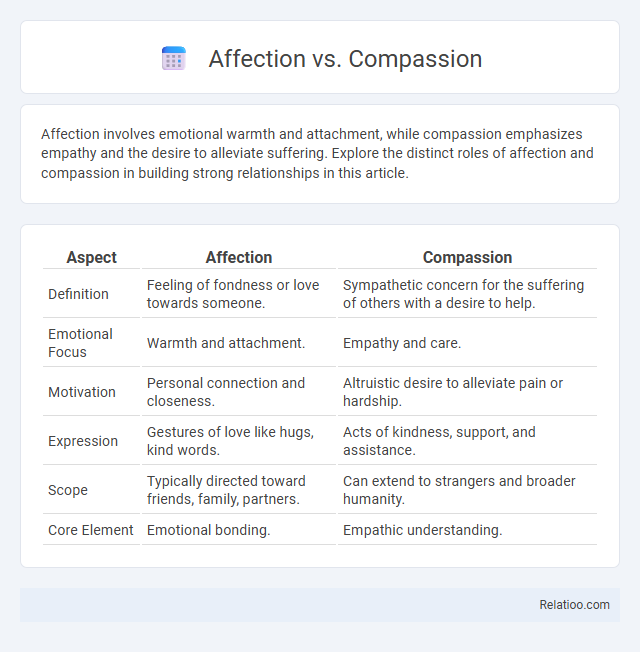Affection involves emotional warmth and attachment, while compassion emphasizes empathy and the desire to alleviate suffering. Explore the distinct roles of affection and compassion in building strong relationships in this article.
Table of Comparison
| Aspect | Affection | Compassion |
|---|---|---|
| Definition | Feeling of fondness or love towards someone. | Sympathetic concern for the suffering of others with a desire to help. |
| Emotional Focus | Warmth and attachment. | Empathy and care. |
| Motivation | Personal connection and closeness. | Altruistic desire to alleviate pain or hardship. |
| Expression | Gestures of love like hugs, kind words. | Acts of kindness, support, and assistance. |
| Scope | Typically directed toward friends, family, partners. | Can extend to strangers and broader humanity. |
| Core Element | Emotional bonding. | Empathic understanding. |
Understanding Affection: Definition and Core Qualities
Affection is an emotional expression characterized by warmth, tenderness, and a genuine fondness toward others, often manifesting through physical touch or kind gestures. Its core qualities include closeness, care, and expressive comfort, distinguishing it from compassion, which involves empathizing with another's suffering, or softness, which reflects a gentle and yielding nature. Understanding affection helps you foster deeper personal connections by recognizing the unique ways it conveys love and emotional support.
What Is Compassion? Exploring Its Deeper Meaning
Compassion is a profound emotional response characterized by empathetic concern for the suffering of others, accompanied by a genuine desire to alleviate their pain. Unlike affection, which centers on warmth and fondness often toward familiar individuals, compassion extends beyond personal connections to encompass a universal commitment to kindness and support. It involves recognizing shared humanity and actively engaging in acts of care that promote healing and well-being, highlighting its deeper ethical and emotional significance.
Emotional Basis: How Affection and Compassion Differ
Affection arises from personal attachment or fondness, generating warmth and positive feelings toward someone specific, while compassion is rooted in empathy and a genuine desire to alleviate another's suffering, often extending beyond close relationships. Affection often involves mutual emotional bonds, whereas compassion motivates altruistic actions regardless of personal connection. Softness relates to a gentle or tender demeanor that can accompany both affection and compassion but is more about behavioral expression than emotional origin.
Behavioral Expressions of Affection vs Compassion
Behavioral expressions of affection often include physical touch, verbal affirmations, and acts of kindness aimed at strengthening personal bonds. Compassion manifests through empathetic listening, offering support during others' distress, and taking actions to alleviate suffering without necessarily involving physical closeness. While affection emphasizes mutual emotional warmth, compassion drives altruistic behavior motivated by understanding and concern for others' well-being.
Motivations Behind Affectionate and Compassionate Acts
Affectionate acts are often motivated by personal attachment and a desire to express warmth or love towards specific individuals, creating a sense of closeness and emotional bonding. Compassionate acts arise from an empathetic response to others' suffering, driven by a moral impulse to alleviate pain or hardship without necessarily expecting reciprocation. Softness relates to a gentle demeanor and approach, influencing behaviors but lacking the direct motivational force behind the intentional expression of affection or compassion.
Affection in Relationships: Family, Friends, and Partners
Affection in relationships manifests as tangible expressions of warmth and care, strengthening bonds between family members, friends, and partners through consistent gestures like hugs, kind words, and attentive listening. Unlike compassion, which centers on empathetic concern during others' suffering, affection builds emotional security and mutual trust by celebrating everyday moments and shared experiences. Softness relates to gentle behavior and vulnerability, but affection specifically nurtures connection by reinforcing feelings of love, acceptance, and belonging within close relationships.
Compassion in Action: Empathy, Altruism, and Support
Compassion in action involves empathy, recognizing and feeling another's pain, coupled with altruism, which motivates selfless acts to alleviate suffering. Your ability to offer support transforms empathy into meaningful deeds that foster healing and connection. This dynamic blend of understanding and proactive care distinguishes compassion from mere affection or softness.
Psychological Benefits: Affection versus Compassion
Affection and compassion both enhance emotional well-being but serve different psychological functions; affection fosters secure attachment and increases feelings of safety and love, while compassion cultivates empathy and promotes healing through understanding others' suffering. Your ability to express affection strengthens social bonds and boosts positive emotions, whereas compassion encourages resilience by helping you manage stress and reduce negative feelings. Prioritizing both can improve mental health by balancing emotional warmth with active care and support.
When Affection and Compassion Overlap
Affection and compassion overlap when your care extends beyond personal attachment to genuine concern for another's well-being, blending emotional warmth with empathetic understanding. Both involve a deep connection, but affection often includes a desire for closeness, while compassion emphasizes alleviating suffering. Recognizing this intersection helps you foster meaningful relationships rooted in empathy and kindness.
Cultivating Both: Integrating Affection and Compassion in Daily Life
Cultivating both affection and compassion enriches your emotional well-being by fostering deeper connections and understanding with others. Affection involves expressing warmth and love, while compassion emphasizes empathy and a desire to alleviate suffering, together creating a balanced approach to interpersonal relationships. Integrating these qualities daily promotes resilience, emotional intelligence, and meaningful social bonds that enhance personal and communal harmony.

Infographic: Affection vs Compassion
 relatioo.com
relatioo.com